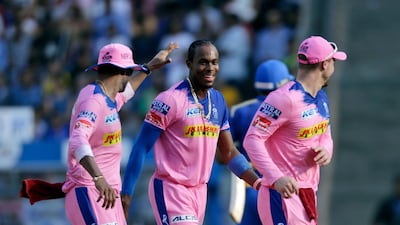It is the sort of thing which can only happen in the rarefied world of the IPL.
A team puts up their entire staff for 80 days in one of the most exclusive hotels in a city full of exclusive hotels, partitioning off a whole chunk of the place for its own use.
They get ready to charter a private jet for five of their late-arrivals from the UK.
They go over and above the standard Covid-19 safety procedures, and invest in extra antibody testing for all of their workforce, too.
And, still they are considered the thrifty ones.
Such are the lavish budgets in cricket’s most cash rich competition, Rajasthan Royals manage to retain the tag of the IPL’s “Moneyball” franchise.
In a competition in which the only constant is change, its inaugural winners are still thought about in much the same way as they were back when the whole thing started in 2008. Meaning, savvy when it comes to spending with their rupees.
The Jaipur-based team were the cheapest of the original eight franchises when the league was created, and they stormed to the first title largely on the back of the charisma of their captain.
Ranjit Barthakur, who has been with the franchise since its inception and is now its chairman, understands where their depiction comes from.
“Earlier, the Moneyball idea came about because we were bought at a very small price, and we won the tournament with Shane Warne there,” Barthakur said.
“Because of that, it stuck. But I don’t think that is true if you go by the figures right now.”
He thinks the initial image of his team is dated now. He points to the fact that hiring players of the standing of Ben Stokes and Jofra Archer in a system like the IPL auction does not come cheap.
He does say, though, they remain committed to “buying competency at a price that is affordable to us”.
________________
Greatest IPL XI
________________
“There is a lot of rigour in what we do to select a team,” Barthakur said.
“We find unknown people. We go to the backwaters of India and find people who were never known before, and we take a risk by giving people a chance.
“When Jos Buttler wasn’t playing well, we took a risk by putting him into the team from Mumbai. [At Mumbai] he didn’t play at all. He was not playing well.
"And in the case of Stokes, there were some disasters for him in the UK, but we said: ‘Cricket is cricket, he is a talented guy.’
“Similarly, Jofra’s first international cricket was with us, before he joined the English team back home.
“We think, in all those cases, it is smart buying. I think we are a smart team.”
If there is an equivalent at the Royals of the Jonah Hill character in the movie based on Michael Lewis’s seminal book, Moneyball, it is Jake Lush McCrum.
Now 27, he is the chief operating officer, having initially been detailed to help with the relaunch of the franchise after its two-year suspension of the league aged just 24.
His background in cricket extends not much further than going to matches at Lord’s with his granddad when he was young, and adding his name to the waiting list to be an MCC member when he was 16.
Which he regards as a positive when it comes to doing his job.
“I absolutely love the sport, but the benefit is that I’m not so much of a cricket badger that I think I know more than anyone else, or the tactics,” Lush McCrum said.
“I know that, when it comes to the auction, it is my job to get the best out of our director of cricket Zubin Bharucha and our head coach Andrew McDonald.
“It is about getting their views and making the best decision based on those, rather than input my own views, because that would never be relevant.”
Lush McCrum had planned to go into venture capital investment when he finished studying economics at university.
He joined a fintech company owned by Manoj Badale, who is also the Rajasthan Royals owner, and advised on mergers and acquisitions. He was soon marked out as a star, and redirected to help out their cricket business.
Although the Royals have not won the title again since its first year, Lush McCrum believes they are still at the forefront of finding undervalued players – even though the world is catching up on their ideas.
“It is something we have historically been leaders in,” Lush McCrum said, saying they are moving towards “machine learning” to get “non-biased views” on players.
“Across the first 10 years of the IPL, we were known as the Moneyball team.
"Our run-per-dollar spend is the highest, and wins per dollar spend is the highest. So basically we were outperforming how much we were spending.
“Teams have certainly caught up. Now it’s our job to continue innovating each year to find new ways.
“Whether that is looking at different metrics – so judging how many balls per six, how many balls per dot, this sort of thing – those are things people are looking at now, but five years ago, people didn’t look at those for judgments.
“If you are looking at specific player roles, when you are looking at balls per six, if someone has a small number of balls per six, and that is your closing role, it would be extremely beneficial.
“Someone might have a 150 strike-rate, but they might require 25 balls to get there.”
He points out that it is an inexact science because prices can escalate at auction if a number of teams are fixed on the same player.
“[But] by doing this, it gives you the advantage that you will get the players who are above average for a lower price than others might,” he said.
“There are always going to be anomalies in the auction structure. That is why the IPL is so competitive, because the teams change and churn through.
“As much as that is a challenge for the brand side, it is fantastic for the cricket competition side.”






















